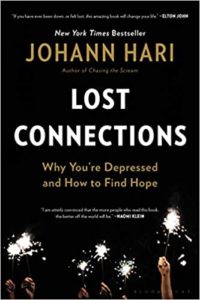It seems we’ve all had a rough year and a half. For some of us, the experience of the pandemic has exacerbated vulnerabilities we already have. For others, new vulnerabilities emerged. In either case, mental health awareness has been brought increasingly into focus- if only for the difficulty in finding help today.

In this powerful episode, EconTalk host Russ Roberts welcomes author Johann Hari to talk about his book, Lost Connections: Why You’re Depressed and How to Find Hope. The conversation begins with Hari describing his personal story of depression and his use of antidepressants. But Hari is clearly not unique in this regard. He describes two mysteries that are the focus of the remainder of the conversation. First, he notes that depression and anxiety have increased throughout the western world, and very acutely over the past eighteen months. Second, Hari wonders why it seems to be increasingly difficult to get through each day, particularly when we are more materially prosperous than at any point in history. So Hari travelled around the world trying to use social science to find answers.
Now we want to hear what you learned from this conversation. Use the prompts below so we may continue the conversation.
1- How do we know that depression and anxiety are on the rise; what evidence does Hari cite? How do depression and anxiety differ, and how has their “official” (i.e., in the DSM) definition changed over time? How might such changing definitions affect the ways in which we experience and/or treat depression and anxiety?
2- The conversation turns to the use of SSRIs in treating depression and anxiety. How compelling is the evidence of their success as a treatment option? For what reasons did Hari think them helpful, and for what reasons does he find them problematic? What does he mean when he says, “‘In theory, we have a biopsychosocial model. In practice, we have a bio-bio-bio model’.”?
3- The point of Hari’s books is to present lost connections as a causal factor in the rise in depression. What does he mean by “loneliness”? What is “social prescribing,” and how might this be an effective means to treat depression?
4- Roberts agrees with Hari that we have fewer connections today. But he also criticizes Hari’s book for leaving out some potential explanations for this loss. What are they, and how does Hari respond? By whom are you more convinced, and why? What should be our response to this loss of connection?
5- How much blame should we ascribe to capitalism for our loss of connection and the rise in depression and anxiety? Explain.


Comments are closed.